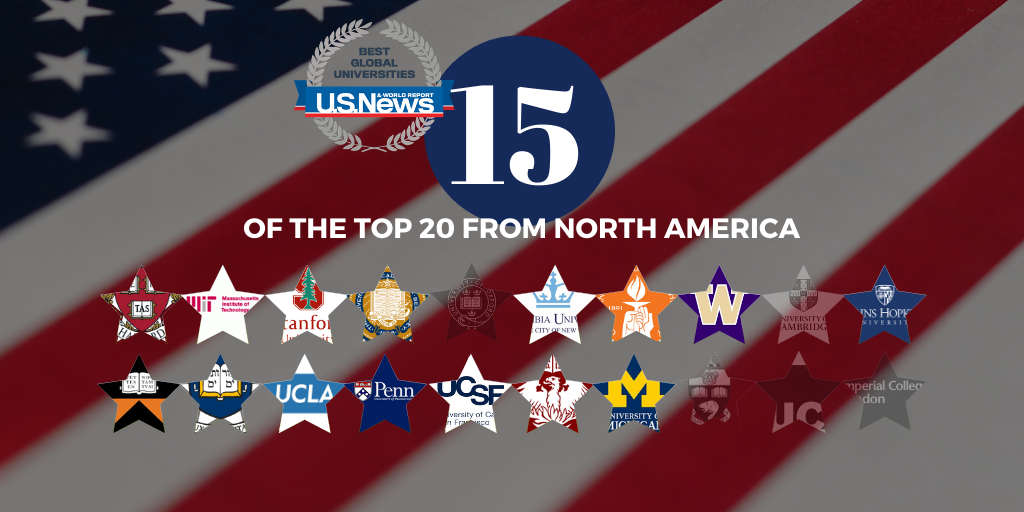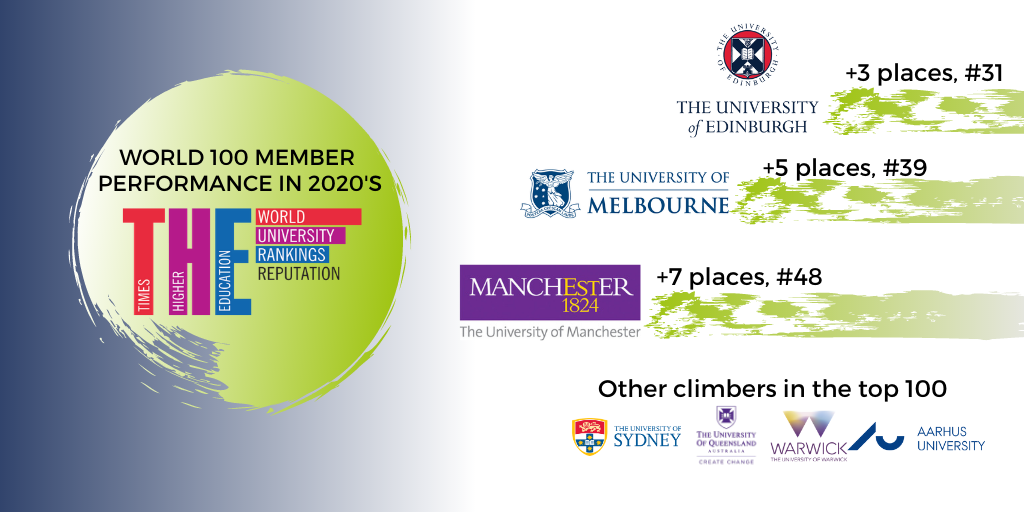US News & World Report’s Best Global Universities, the last of this year’s “big four” rankings, was published in late October; followed by the THE Reputation Rankings.
US domination continues in USN&WR
North American institutions dominate the upper reaches of the Best Global Universities 2021 table, with 8 of the top 10 (and 15 of the top 20) from the US. The University of Toronto (17th, up one place) leads the way for W100 members, followed by the universities of Melbourne, Sydney and Edinburgh.
60% of members of the World 100 Reputation Network improved or maintained their overall ranking compared to last year. This performance was in line with this year’s QS World University Ranking but substantially different to the THE World University Rankings, which saw 72% of W100 members rising.
More surprisingly, only 53% of W100 members improved their rank for ‘global reputation’. In the other tables, W100 academic reputation scores tend to out-perform the overall ranking. There are several differences in the methodologies of the reputation surveys with USN&WR surveying smaller numbers, and including interviewees from a wider pool than recently published faculty. USN&WR allocates 25% of the total ranking score to the results of its reputation survey compared to 33% for THE and 50% for QS.
Regional trends – Australia & Europe rising
Australian universities did particularly well in the latest ranking, with all six W100 members improving or maintaining scores. UNSW Sydney and University Technology Sydney both maintained their recent impressive progress up the tables, with rises of 13 and 36 places respectively.
Most of the European W100 members improve their ranking positions, and with notable gains in global reputation ranks for Helsinki (up five) and Maastricht (rising 25 places).
W100 members from Asia performed well with National University of Singapore and Korea University rising. An interesting insight from this year’s data is that all Asian W100 members ranked substantially higher for global reputation than in the overall table. This may reflect a similar effect to that reported in the recent THE reputation rankings which showed Asian academics ‘voting’ in greater proportions for universities in their own region.
Anomalies abound
The methodology of the USN&WR ranking, which features 13 different metrics, tends to throw up some findings that contrast with other tables. For example, the London School of Economics & Political Science (LSE) ranks 244th overall in USN&WR, compared to 27th in THE and 49th in QS, both of which has adjusted methodologies to ensure they do not penalise specialist institutions and particularly those without medical schools. It is also notable that LSE ranks 31st for Global Reputation in USN&WR.
Another anomaly from the data shows a substantial group of universities that rank much higher for ‘global reputation’ compared to ‘regional reputation’. Amongst W100 members, all the institutions falling into this group are from the UK suggesting perhaps that colleagues from the rest of Europe are really taking Brexit to heart! Alternatively, UK respondents to the reputation survey may take a generally more international view and don’t vote for fellow UK universities.
THE Reputation Rankings – superbrands reign supreme
The 2020 version of the THE Reputation Rankings, featuring results from the same academic surveys that feed the wider World University Rankings, were released on 3rd November. The unique methodology, with scores for all other institutions in the table expressed as a percentage of Harvard’s, usually results in a very static ranking. This year there was some movement with University of Tokyo edging up one place to ‘disrupt’ the top 10 which had been the same for the past 2 years.
THE also increased the number of universities ranked to 200, compared to 100 in previous years. W100 Reputation members improving their positions included Edinburgh (31st, up 3), Melbourne (39th, up 5) and Manchester (48th, up from the 51-60 bracket). Sydney, Queensland and Warwick also progressed, and Aarhus entered the top 100.
Perhaps more interesting than the table itself was some of the background analysis provided by the THE at the rankings launch, part of their Leadership and Management Summit. Two particularly notable insights were:
- Academics from Asian universities answering the THE reputation survey tended to nominate universities from their own continent much more frequently than those from North America and Europe. This may influence the performance of some Asian universities in the reputation rankings – Tokyo, Tsinghua and Peking all rising in the top 100
- THE revealed that the academic reputation survey now includes an additional ‘experiential’ question, asking respondents to nominate universities they were familiar with, in addition to the standard question about universities they perceived to be best in their field. However, data from the new question is not currently included in the rankings, only to universities buying data and consultancy from THE.
The cycle begins again
Whilst the main global rankings for this year are now all launched, rankings activity continues, with QS continuing to announce new regional league tables over the coming weeks.
And the data collection to inform next year’s rankings is already underway. THE have launched their Academic Reputation Survey to inform the 2022 World University Rankings.



